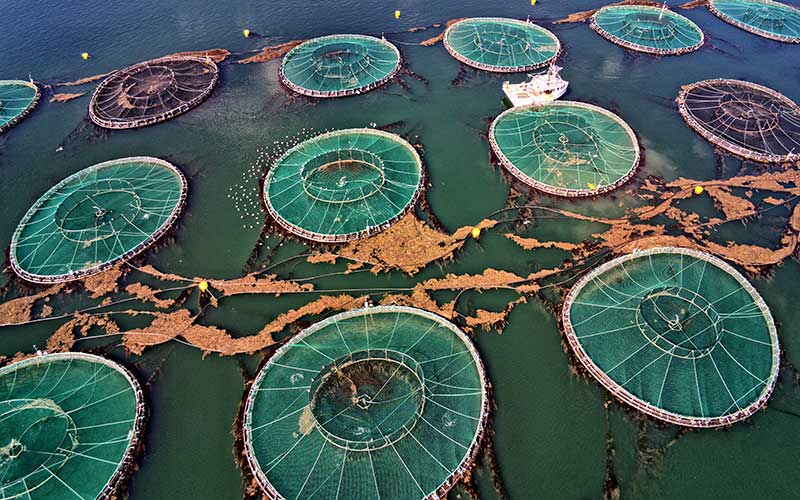
Dirty, unregulated industrial salmon farms put our waters at risk. Photo: Shutterstock
January 14, 2025 Update: On January 14, 2025, Conservation Law Foundation filed a complaint in US District Court in Maine against Cooke Aquaculture. Read a PDF of the full complaint.
November 14, 2024 (Boston, MA) – Conservation Law Foundation (CLF) has notified Cooke Aquaculture of its intent to sue for Clean Water Act violations at 13 active sites in Maine where Cooke grows millions of salmon in 150 cages. The Canadian company regularly pollutes Maine’s iconic bays and negatively impacts recreation and the lobstering and fishing industries.
“These enormous salmon cages are like sewage pipes to the marine environment,” said Heather Govern, Vice President for CLF’s Clean Air and Water Program. “Their solid waste smothers plants and ocean life while disease outbreaks and sea lice threaten nearby endangered wild salmon. We need to enforce our federal laws to protect Maine’s bays and communities.”

Most of these salmon cage sites are located in coastal communities where lobstermen and fishermen depend on clean and unpolluted water for their livelihoods. Fish feces, uneaten food, and uncollected pieces of dead fish fall through the bottom of Cooke’s cages onto the seafloor to form a thick layer of toxic sediment. That pollution kills the food source for lobster and bottom-feeding fish, like flounder, cod, and haddock.
Salmon confined to net pens suffer from disease and parasites like sea lice at an unnaturally high rate. These diseases and parasites can spread from the cages to passing wild fish. In addition, Cooke’s cages periodically develop holes from exposure to weather and predators like seals, which allow caged salmon to escape. When cage-raised salmon breed with wild salmon, the genetic fitness of the wild salmon population is diminished.
To comply with the law, Cooke will need to hire more employees and experts to increase its monitoring and inspections, properly maintain and clean its equipment, and mitigate the impact on the environment.
Read a PDF of CLF’s notice of intent.
Supportive quotes can be found below.
CLF experts are available for further comment.
###
Supporting Organizations
“New evidence documenting Cooke’s chronic violations further illustrates Cooke’s ongoing pattern of disregard for the laws of this state. If Cooke wants to operate in Maine, they should start playing by the rules or be hit with larger fines that finally get their attention.”
– Downeast Salmon Federation, Dwayne Shaw, Executive Director
“Cooke Aquaculture’s salmon net pens cause massive environmental damage. Our coastal waters are one of Maine’s most treasured ecosystems, and companies like Cooke are a huge threat to Mainers who rely on these waters and want to enjoy them for generations to come. We fully support the Conservation Law Foundation’s efforts to enforce federal law and hold corporate polluters accountable.”
– Sierra Club, Maine Chapter, Andrew Blunt, Coastal Advocate
“Cooke Aquaculture has been the subject of legal action around the world. As stated in the notice of intent to file against Cooke’s Maine operation, Cooke continues to violate regulations and permit conditions meant to protect the environment. Neither the Department of Marine Resources nor the Department of Environmental Protection has taken effective enforcement steps to prevent or remedy these violations. Protect Maine stands with those taking this action concerning Cooke and will continue its work to stop industrial-scale aquaculture from owning the coast of Maine.”
– Protect Maine’s Fishing Heritage Foundation, Crystal Canney, Executive Director
“Frenchman Bay United applauds CLF’s legal efforts to assure that Cooke’s salmon farming operations in Maine comply with our clean water laws and that they don’t jeopardize the continued abundance of the natural resources found in the Gulf of Maine.”
– Frenchman Bay United, Henry Sharpe, President
“The Friends of Blue Hill Bay supports responsible and sustainable uses of the rivers and oceans. If CLF’s actions promote that worldview, we are in total support of their efforts. The Friends of Blue Hill Bay is hopeful the aquaculture industry can and will adjust to develop more responsible and sustainable methods that comply with Federal and State environmental laws so that the environment and employment opportunities can coexist successfully.”
– Friends of Blue Hill Bay, Mike Fedosh, Administrator
